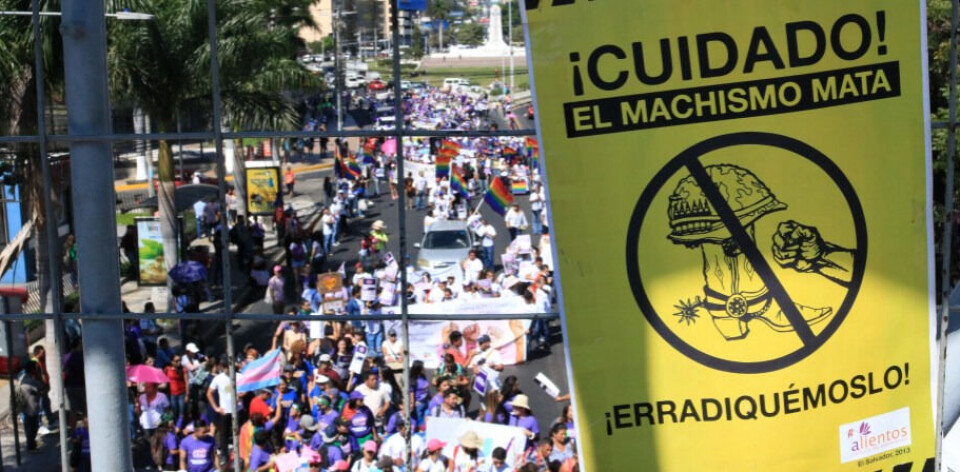THIS ARTICLE/PRESS RELEASE IS PAID FOR AND PRESENTED BY the Norwegian University of Life Sciences (NMBU) - read more

No safe place: Living on the margins of El Salvador
New research uses the experiences of vulnerable young women, trans women, and sex workers in El Salvador to explore the security situation in the violence-stricken country.
“El Salvador is one of the most violent countries in the world and a dangerous place to be a woman” opens the PhD thesis of Erika Rojas, who explored gendered violence in the country for her recently completed doctoral research.
As well as frequent natural threats from earthquakes and volcanic activity, El Salvador has one of the highest crime rates in Latin America. Drug cartels, warring street gangs and corrupt security forces have turned the country into one of the world’s most dangerous places outside an official war zone. The threat of sexual violence against girls, women and trans women is a growing factor behind the refugee crisis unfolding in the region.
Clashes between the police and gangs are common in El Salvador’s capital, San Salvador.
Impoverished women are frequent targets of different forms of violence. For them, the police and military are major threats to their security, as well as the gangs, their own families, and alienation from the general public.
Fending for themselves
Over a period of three years, Erika Rojas interviewed and observed three vulnerable groups of people in the city of San Salvador: impoverished young women, trans women and sex workers.
She used this information to explore the lack of security in the country from the perspective of some of its most marginalised and vulnerable citizens. The research shows that these women are largely fending for themselves in terms of avoiding violence and persecution.
Rojas heard how Salvadoran women have learned to negotiate their own security on the streets of San Salvador, with many saying that their security ‘depends on them’ – that women in the country have come to understand their own vulnerable situation, and that they cannot trust anyone. Their security is dependent on how adept they are at taking care of themselves, as there is no external help to be had.
The women define security as the ability to walk around freely, to express themselves, and to live in their country without fear of harassment and violence because of their gender identity, sexuality, the way that they are dressed, or the type of work they do.
For these women, security is not equated to men with guns protecting the population against criminals – it is often these so-called security-providers that are the aggressors.
Instead, they describe security as the capacity of society to recognise others’ ways of living, respect from their fellow citizens and a life free from violence.
Between gangs and the police
“There have been very few studies that explore the gender-related aspects of security in El Salvador. Most research to date is embedded in a state-centred approach to analysing security in the country. My research fills this gap, recording the situation as it is experienced by some of the most vulnerable sectors of Salvadoran society," Rojas says.
She analysed the relationships that these diverse women have with their communities and the police. A common theme, she found, was the complexity of having to live between the police and gangs as the recognised local security providers.
“Marginalised women and LGBT people in San Salvador are exposed to different forms of violence and threats to their security that are not considered in the public security narrative of the country. Their experiences reveal that they can feel simultaneously safe and threatened in the places or contexts they inhabit - with people they trust, and under the vigilance of security providers - throughout their lives," she says.
Targeted security policies
Recording and amplifying the perspectives of women on the side-lines of society will widen the security discourse of the violence-stricken country.
Rojas’ findings should be useful for security policymakers and practitioners in El Salvador and other Central American countries. They can be used to promote security practices that are targeted at those who really need it and that are sensitive to gender, sex, age, and race.
“Security concerns us all but some groups of people are more vulnerable than others. Usually, these groups are not taken into account when drafting security policies, or even when thinking about the meaning of security. This research is an invitation to move the discussion of security in El Salvador – and elsewhere - to the perspectives and experiences of those groups of people who have been marginalised and who are most vulnerable. This is a way to challenge traditional and dominant security approaches and the unequal power logics that support them," Rojas says.
Erika Rojas will defend her doctoral thesis ‘There is no safe place.’ Narratives of Everyday Gendered In/Security at the Margins in El Salvador at the Norwegian University of Life Sciences on Tuesday 16 May from 12:15.
You can attend the event via Zoom.
See more content from NMBU:
-
Shopping centres contribute to better health and quality of life
-
We're eating more cashew nuts – and the consequences are serious
-
Do young people with immigrant parents have better health?
-
Who’s picking your strawberries this summer?
-
Can coffee grounds and eggshells be turned into fuel?
-
Rising housing costs fuel inequality in Norway





































